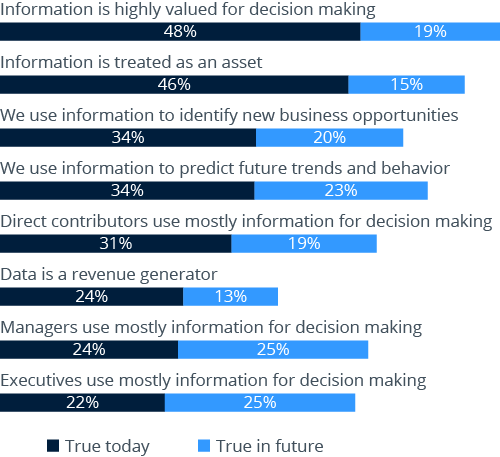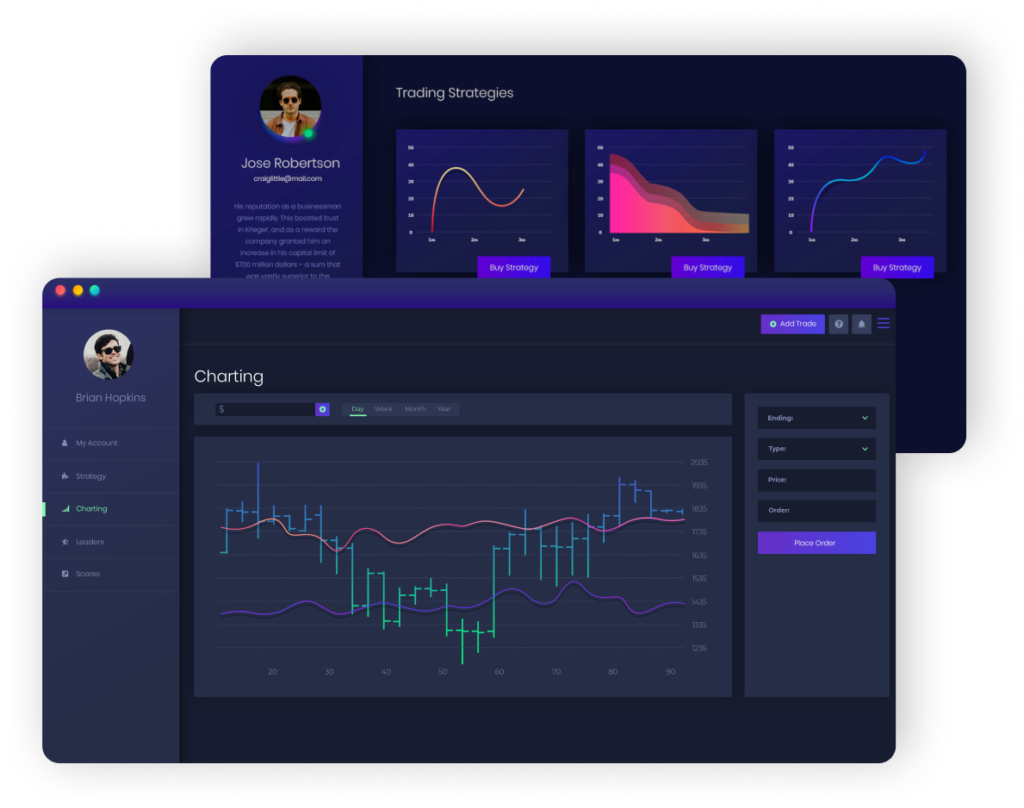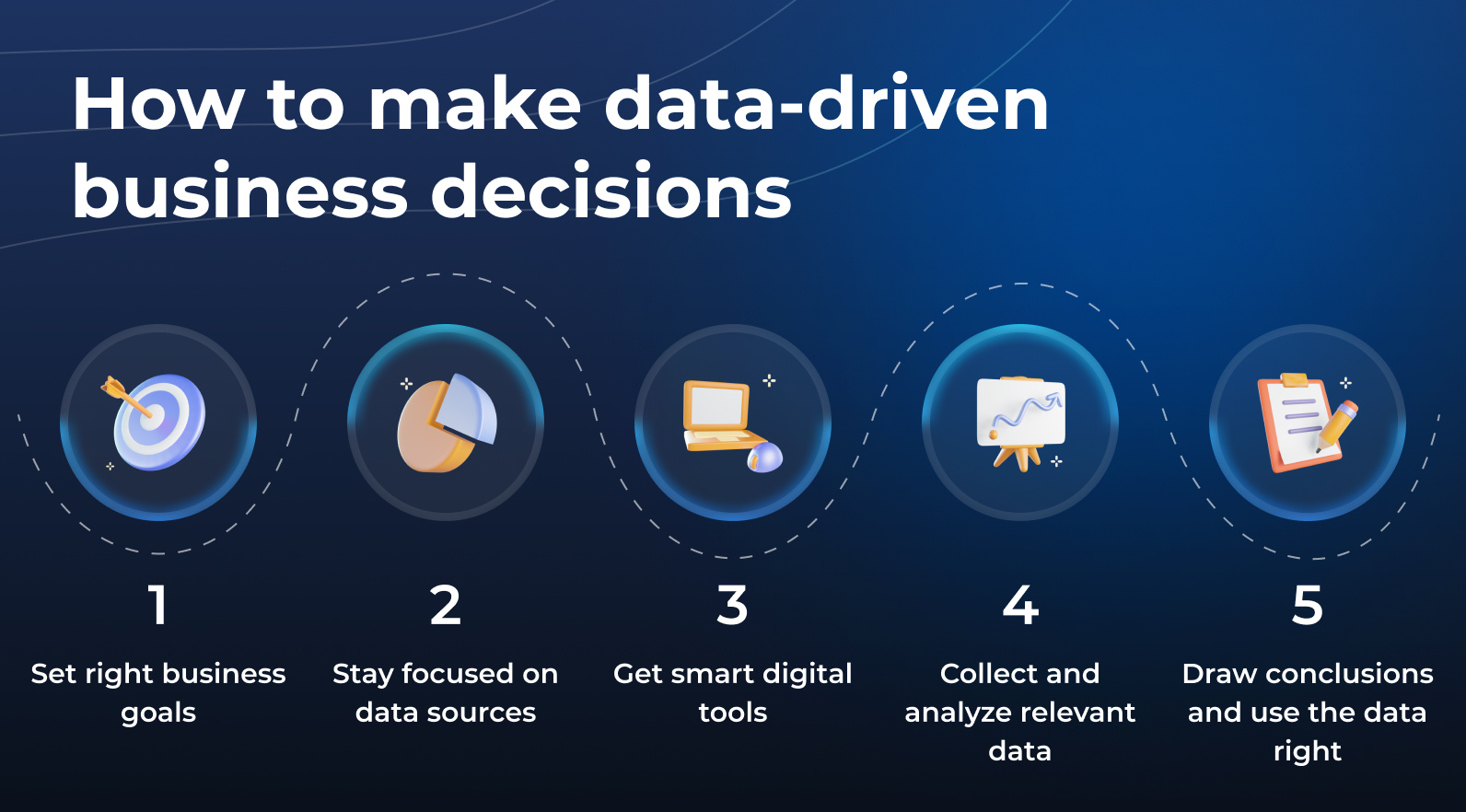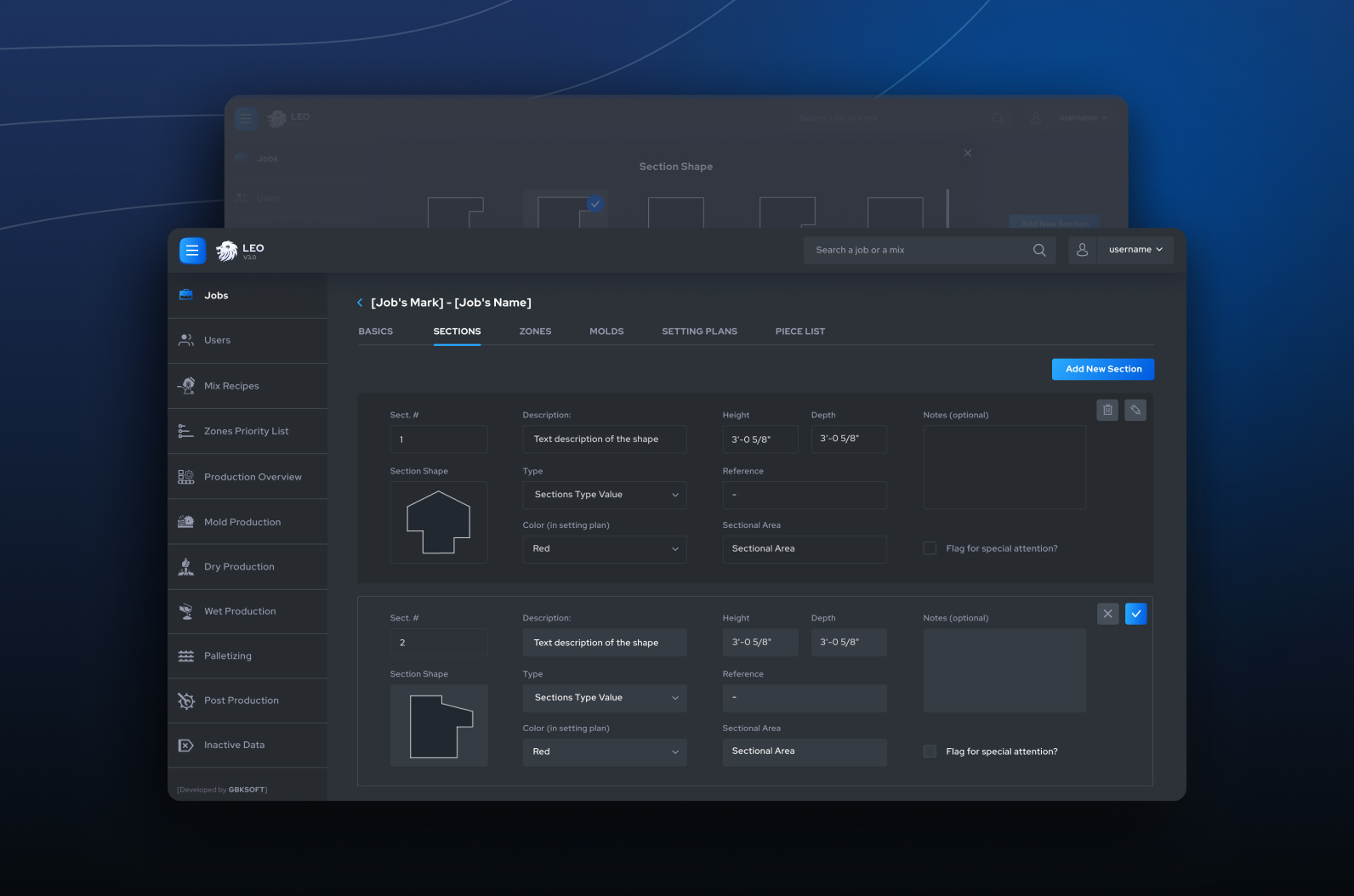Table of Contents
These days businesses of all sizes deal with huge piles of data on a daily basis. They handle employees, clients, finance, accounting and other data and try not to get lost in the influx of many files and numbers. And while one companies actively use Big Data and other smart technologies to help them, others still struggle and can’t leverage data-driven decision making to achieve ambitious business goals.
If you take a look at the research dedicated to data-driven decision making, you’ll find out that companies started to value their information more and some of them even treat their data as an asset. Here are some numbers that demonstrate how data is treated in modern world business organizations:

Data-driven decision making in a nutshell
So first things first, let’s talk about data-driven decision making (DDDM) and find out how it is performed and what it requires. In general DDDM implies that the company not only collects and stores all the relevant data, but also analyzes it and uses it for decision-making.
The planning, strategy and everything that influences the further business course of the company should be made based on real numbers, and verified and thoroughly analyzed data.
This means that your company needs additional digital tools for data collection, analysis and validation. DDDM tools can vary for different businesses. While some companies may need to collect survey responses, analyze client portraits and explore indexes, others may require tools to analyze all data that company already has but does not use to its advantage.
All in all, to make data driven decisions all companies should perform all or some of the following activities on a regular basis:
Speaking about the tools that help with data-driven approach, we would name BI tools, CRMs, ERPs, and analytics software the go-to options. We will talk about all of them a little bit later, and now let’s proceed to the real value DDDM can bring to your business.
The importance of data-driven approach
In our fast developing world data-driven decision making makes a big difference for companies and grants them incredible competitive advantage. It is not enough to have huge piles of data at your disposal, it is important to use that data right and make it bring you some real value.
When it comes to data-driven decision making, its importance is defined by the things that it can help you to improve within your company. By analyzing your data and using it right, you will be able not only to make confident decisions but also to:
Ensure continuous business growth – if you have serious business goals, you need to rely on how things really are going in your company. Analyze your data and metrics, discover productivity bottlenecks and fix them, generate key insights and see how DDDM pushes your business towards success.
Discover new business opportunities – thanks to data-driven decision making you can get a 360-degree view of your business, visualize the data, and make your business judgments more clear. Thanks to deep analysis of the market, competitors, your client base, you will discover new unexpected opportunities leading to organizational success.
Improve customer experience – DDDM allows you to focus more on the quality of your goods or services and ensure incredible customer experience. By collecting information about your customers, their preferences and habits, you can make more informed decisions and expand your service or goods lists accordingly.
Make your company more adaptable – DDDM tools offer a high level of adaptability. By learning more about your business from the analyzed data, you can understand what emerging market trends to follow, what business patterns to adopt and how to make them a perfect fit for your business.
Improve communication within departments – when your business and all departments function as one well-organized data-driven unity, your employees can share their insights and collaborate with each other way easier. You get a chance to create one solid strategy and help all departments follow it and communicate effectively by using real numbers, indexes and metrics.
Drive innovation -the world of technologies and data-driven culture do not stand still and to remain competitive on the market, it is crucial to be an innovative company. Your employees should always learn and create more and keep working on their daily tasks efficiently. And this is possible only when you have a specific smart ecosystem and treat your data as an asset.

Our experts have already covered the data-driven approach and described how to start transforming your business with what you have and keep adding what’s missing. Check out that post here and let us know your thoughts or questions.
Top 5 benefits you’ll get by leveraging DDDM and data analysis
Data-driven decision making helps not only to transform the companies, but also provides them with a range of great benefits. Thanks to this modern approach you can fully rely on your digital tools, analyzed data and motivated employees. And apart from that you can get the following advantages.
#1 Reduced costs
In business all decisions go hand in hand with financial risks. And if you make the wrong move, you may end up losing your profit and investing more than you’ve expected. However, with a data-driven decision making process you can avoid a lot of risks and make more informed decisions minimizing chances of budget loss.
#2 Confident business decisions
Informed decisions can really move business forward, but you can not count only on the data while making them. It’s the combination of your experience, observations and data-driven approach that leads to incredible results. By taking into account analyzed data you can create a more precise business forecast and adjust your decisions to reach your goals.
#3 Reasonable and measurable goals
Thanks to data driven decision making process you receive a lot of valuable insights that can be used to alter your business strategy. Knowing your performance, market trends and customer behavior patterns, you can set more reasonable and measurable goals, and set realistic KPIs.
For example, knowing your real number of customers and the average cost of their orders, you can plan to grow your client base and increase profit by x% till the desired time. Then you perform periodical analysis and see if your company moves any closer to that goal.
#4 Optimization of processes
There is always a place for improvements especially when you own a growing company. Chances are you will need to take care of process optimization with time. However, it is impossible to do it right without collecting relevant data about performance, analyzing data and seeing what changes in what department are required.
DDDM helps to improve risk management, estimation of labor cost, onboarding of new team members, hiring process, and customer service provided by your company.
#5 Better problem solving approach
All businesses have their challenges, and the best way to resolve them is to find the initial reason that caused the issues. It is not wise to draw conclusions based only on obvious facts, it is always better to dig a little bit deeper and see what your data and numbers are trying to tell you.
Should you cut costs or invest more? Do you need new team members or it’s better to educate your current ones? What do your clients appreciate and dislike? The answers to all these and many more other questions can be found thanks to data analysis and data-driven approach.
Business leaders that already are data-driven
While the advantages of data-driven decision making process are quite clear, you may still be wondering how DDDM can be used in practice. So we have collected a few examples of business leaders that actively use data analysis, Big Data, business intelligence tools and a lot of advanced technologies to make data-driven decisions. Let’s take a look at them right away.

Netflix
This company is famous for making blockbusters that cost a lot of money and take a lot of time to shoot. But did you know that Netflix makes business decisions based on predictive data analysis. The company analyzes plays, subscriber ratings, and search results to find out what is of interest to their clients.

Uber
Uber is a successful corporation that actively resorts to data-driven decision making. This company uses predictive analytics to delve into historic data, analyze crucial metrics like ride requests, time of rides and many more. As a result Uber finds out the real demand and uses this knowledge to increase profit .

Amazon
This company knows firsthand how important it is to know what your clients want. Amazon uses the power of a data-driven approach to power up their advertising and recommend relevant goods to people. The company uses ML and advanced data analytics to analyze client profiles, their purchase lists and find out real demand.

Google is highly focused on employee comfort, productivity and right leadership. That is why the corporation performs regular performance review, collects real indexes and makes in-depth analysis. This helps Google to identify HR issues, and gather data-based insights on how to improve teamwork.
Top 5 steps for making your business decisions data-driven
Now is the right time to transfer to data driven decision making and let this approach amplify your business. To use data effectively and boost your performance, you need to complete several key steps. Since Altamira is a data-driven company that also develops solutions improving data-driven decision making process, we’d like to share with you some tips on how to complete transformation in your company.

#1 Define your business goals
Every transformation starts with thorough research that helps to identify a company’s mission, goals, and desired outcomes. You cannot see new business opportunities clearly if there is no vision of your main goals.
So before utilizing data-driven decision making, before starting to gather data and perform data analysis, you need to know what you are trying to achieve. Do you want your company to increase its income, expand its client base, improve customer service or maybe present something new and prepare the audience for it?
Raw data itself does not bring any value to companies. You need to know precisely what aspects of your business you are going to delve in. And that’s exactly what the research step is for.
#2 Focus on your data sources
To make data-driven decisions you should have only reliable and useful data at your disposal. So when you’ve settled with your business goal, it is time to pay attention to the sources you get all your data from. You probably have a website with feedback forms, social networks, your own client bases and databases. But chances are that your data is not treated like a unity and you are missing a lot of crucial information.
Apart from data analysis, you should always be focused on metrics and try to find them in the data gathered from all your sources. Perhaps you need to measure your ROI, gross profit margin, productivity, customers satisfaction, overall or periodical revenue, etc. Try to select your key indexes, interconnect them and make data-driven conclusions.
#3 Invest in reliable digital tools
As you can see, it is not so easy to start making data-driven business decisions, and you need to take care of so many things and processes first. And while it is all quite clear with setting goals and identifying data sources, it is hard to understand what to do with the gathered data further.
Well, whatever business you run, you will need to invest in reliable software for automating data collection process, data analytics, reporting and drawing the right conclusions. Based on our experience, we would recommend you to consider getting business intelligence tools, CRM or ERP systems, predictive analytics software, and make sure those solutions are powered by the latest technologies and Big Data. They can become your irreplaceable digital helpers and help you make more wise, reasonable and data-driven business decisions.
#4 Collect and analyze the data
Right data analytics is the key to your company’s success. And luckily with multifunctional digital tools you do not need to hire a lot of data analysts, since the solutions will do all the job for you.
Thanks to software you can analyze data, extract insights from numerous reports, perform in-depth analysis of customer and employee feedback, find current trends and useful patterns, explore KPIs, and last but not least – organize all the data in a highly meaningful way.
Analysis helps to uncover the obstacles that do not let your business keep growing. Maybe it’s because of the low satisfaction rate of clients, maybe because your KPIs are unrealistic, maybe the engagement and motivation of your employees dropped and you did not even know that. Whatever is the case, powerful analytics and data visualization will point out the right reasons and your decisions regarding further actions will be data-driven and not based on gut feelings.
In case you are going to use AI and ML powered software, then the decision making will be much easier for you. Smart solutions will help you collect, analyze and present everything in a more organized way, and also generate some data-based predictions.
#5 Use analyzed data to your advantage
Once you’ve performed data analysis, it is time to draw conclusions and set new measurable goals for the near future. Drawing conclusions is crucial, because you will find out whether your assumptions and expectations coincide with reality. You will probably have a lot of new and unexpected business insights at your hands, and your main task will be to connect them with your business strategy and vision.
Data-driven decision making is complicated but only this approach lets you get the full picture of your business and understand what’s missing to make your business a success. It is important to always stay data-driven and perform periodical analysis of all your data to avoid biases, adjust strategy, and set new objectives.
Tools that Altamira develops for DDDM
The Altamira team advocates a smart and analytical approach to all the data used and collected by companies. We ourselves make data-driven decisions and help our clients to implement all necessary solutions so that they can do this too. Among such solutions there are:
- feature-rich CRM systems with data analytics tools;
- complex ERP systems with employee and customer data visualization tools;
- business intelligence solutions powered by business intelligence, machine learning, artificial intelligence, and Big Data;
- data science apps for better investment analytics, exploration of trends and performing deep data processing.
Our team also helps with the modernization of your current business solution so that you can fully benefit from them and new technologies helping with data-driven decision making. We modernize ERP and CRM systems, management solutions, web and mobile applications and many more. So in case you feel you do not use all your data properly and lack some tools to do this, we offer a free expert consultation and help with selection of right solutions and option sets.
Speaking about the examples of software that we build, we’d like to showcase one particular success story. It is about the company Nelson Precast and holistic ERP system named LEO that truly transformed this construction business. Before the development of LEO system company struggled with a lot of data-related issues:
- the orders were hard to track and some data got lost;
- there were no production overview and full business picture;
- it was hard to check the quality of produced construction pieces;
- the planning and scheduling of jobs were not precise.
As a result, the company struggled because employees were overloaded, a lot of data got lost, and it was hard to proceed with data-driven decision making since the data was chaotic. Therefore the company came to us with the request to build an ERP system to put all their data in order. We developed LEO that has a lot of options and incredible design.
You can check this project in our portfolio. LEO turned out to be very effective and the business owner saw immediate results from its implementation. This ERP system helped the company to track all necessary data, analyze it, see what can be changed and how, and proceed to drawing data-driven conclusions. It definitely made the business more flexible and allowed to plan its further growth. And that is the main outcome of using the right business tools and resorting to DDDM.

To conclude
Data driven decision making is a really powerful approach that has an immediate impact on business decisions. By implementing DDDM in your company you will be able to make solid decisions, reduce human mistakes, gain competitive advantage and increase profit drastically.
However, to fully benefit from a data-driven approach, you need to take care of reliable software. And now is the best time to do this and drive your business success. Altamira can help you with software development and transition to data-driven decision making in no time, so in case you are interested – just drop us a line.



